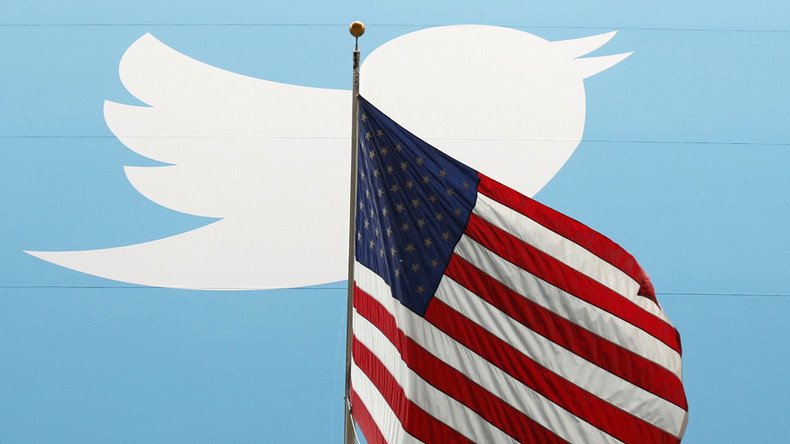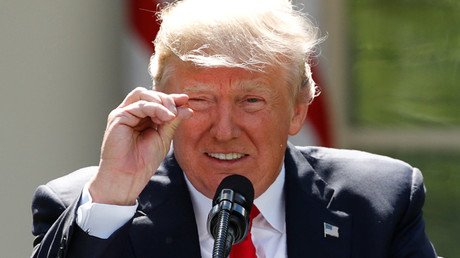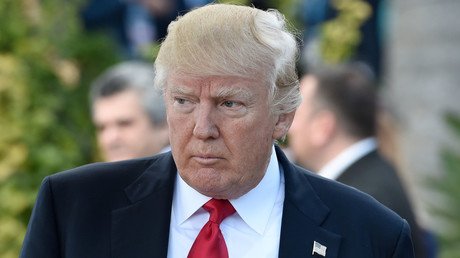Trump violated Twitter users’ First Amendment rights by blocking them – lawyers

A legal group wants US President Donald Trump to unblock users from his Twitter account, arguing that his account constitutes a “designated public forum.” Blocking individuals is, therefore, a violation of constitutional rights, the lawyers claim.
On Tuesday, lawyers from the Knight First Amendment Institute at Columbia University sent a letter to Trump, asking him to unblock the Twitter accounts of two individuals who they say were blocked because “they disagreed with, criticized, or mocked” his actions as president.
They argue that Trump’s Twitter account @realDonaldTrump is a “designated public forum” and blocking any users from the account based on their viewpoints would be considered a violation of their First Amendment rights.
Good tweet. Supports our view that @realDonaldTrump is a “designated public forum" under the 1st Amendment. https://t.co/xj6neydo6kpic.twitter.com/Cw7KwkRZHC
— Knight 1st Amendment (@knightcolumbia) June 6, 2017
“Though the architects of the Constitution surely didn’t contemplate presidential Twitter accounts, they understood that the President must not be allowed to banish views from public discourse simply because he finds them objectionable,” said Jameel Jaffer, the Knight Institute’s executive director, according to a news release.
The institute argues that in blocking the accounts, Trump has suppressed their speech by denying them the ability to follow the president on Twitter and has limited their ability to view his tweets, or learn which other users follow his Twitter account. They also claim that Trump limited their ability to participate in comment threads associated with his tweets.
Lawyers from the institute are representing Holly O’Reilly, who goes under the Twitter handle @AynRandPaulRyan, and Joseph Papp, who uses @joepabike, both of whom were blocked from viewing tweets from the president after they posted dissenting or critical tweets.
O’Reilly was blocked on May 28, after she posted a GIF of Pope Francis glancing at Trump with an uncomfortable expression along with a caption that said: “This is pretty much how the whole world sees you.”
This is pretty much how the whole world sees you.#AMJoy#SundayMorningpic.twitter.com/CycqYnKg8b
— Holly O'Reilly (@AynRandPaulRyan) May 28, 2017
Papp was blocked on June 4 after replying to the president’s weekly address with “Why didn't you attend your #PittsburghNotParis rally in DC, Sir? #fakeleader”
Papp later tweeted that he is a registered Republican and said Trump was “so mentally weak & intolerant of dissent he blocks US citizens critical of his policies from even reading his latest pronouncements.”
And I'm actually a registered #Republican still & voted in primaries last month! Amazing that @realDonaldTrump stifles even @GOP dissent! pic.twitter.com/xi94AwXPVM
— Joe Papp (@joepabike) June 4, 2017
“Of course, it is easy to understand why you and your advisers might have found our clients’ posts to be disagreeable. Even if the posts were scornful and acerbic, however, they were protected by the First Amendment,” the lawyers wrote.
In their letter to Trump, the institute cited an oral argument from the Supreme Court in February, in which Justice Elena Kagan called Twitter a “crucially important channel of political communication.”
“Everybody uses Twitter,” Kagan said. “All 50 governors, all 100 senators, every member of the House has a Twitter account.”
Justice Anthony Kennedy also compared Twitter to the public square, saying “their utility and their extent of their coverage are greater than the communication you could ever had, even in the paradigm of public square.”
The institute argues that Trump’s Twitter account is a designated public forum “for essentially the same reasons that open city council meetings and school board meetings are.”
Inadvertently furthering their argument was White House Press Secretary Sean Spicer, who said on Tuesday that Trump’s tweets should be “considered official statements by the President of the United States.”
Another twist: now @PressSec says @realDonaldTrump's tweets are official White House statements.
— Jake Sherman (@JakeSherman) June 6, 2017
The letter focuses on Trump’s personal account, but the lawyers argue it applies to the @POTUS account as well.
The institute argues that as more public officials use Twitter and other forms of social media in an official capacity, the courts will need to decide “the new contours of First Amendment protection.”
“When new communications platforms are developed, core First Amendment principles cannot be left behind,” said Katie Fallow, a senior litigator at the Knight Institute, according to the news release. “The First Amendment disallows the president from blocking critics on Twitter just as it disallows mayors from ejecting critics from town halls.”














